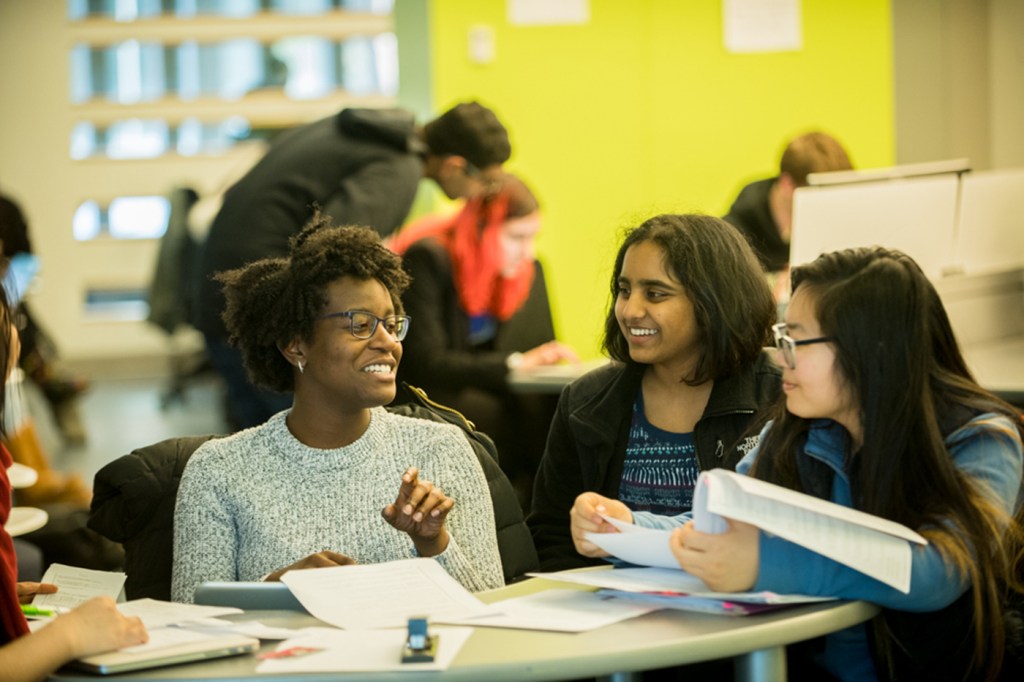Northeastern University launches national program to boost the number of women majoring in computing

Northeastern is launching the Center for Inclusive Computing with the goal of increasing the representation of women in technology. The Center will collaborate with universities across the United States that have large undergraduate computing programs to bolster their efforts to increase the student population of women and underrepresented minorities.
Over the course of the next six years, the Center will provide funding and support to not-for-profit universities that have 200 or more computing graduates annually. Funding will be used to implement evidence-based strategies to address the gender gap in computing, which includes the fields of computer science, information science, data science, artificial intelligence, and cybersecurity.
The ultimate goal is to move some of the biggest undergraduate computing programs toward a “critical mass” of enrollment by women, said Carla Brodley, the dean of the Khoury College of Computer Sciences at Northeastern, who will oversee the Center for Inclusive Computing as its founding executive director. The structural changes implemented through this initial effort will enable the universities to continue improving graduation figures over time.
“We are so excited to partner with other universities in this process,” Brodley said. “We anticipate that we’ll learn from each other, and our field as a whole will benefit from this massive collaboration.”
As dean of the Khoury College of Computer Sciences, Brodley has increased the percentage of incoming undergraduate students who are women from 21 to 31 percent in four years. Khoury offers 34 majors that pair computer science with subjects outside the field, such as English, biology, or business administration—in these combined majors, women comprise 33 percent. In addition, she has expanded Align, a master’s program in Computer Science designed specifically for students who don’t have a technical or computing background. By the fall, Align will have grown from 11 to 850 students in six years; 46 percent of new students are women.
According to the U.S. Department of Education’s National Center for Education Statistics, in 2017, the latest year for which data are available, women received 56 percent of bachelor’s degrees but only 19.5 percent of degrees in computing. The share of women who receive bachelor’s degrees in computing has hovered just under 20 percent for the past decade.
The Center is being funded by a grant from Pivotal Ventures, an investment and incubation company created by Melinda Gates.
The Center for Inclusive Computing will utilize the expertise of Northeastern faculty and recruit a set of technical consultants from other universities with first-hand experience in the best practices that have shown to narrow the gender gap in computing. They will work with each grantee university to codesign ways to recruit, enroll, and retain female students in their respective programs. Colleges and universities interested in applying can learn more at the Center’s web site.
Furthermore, an advisory council will guide the overarching strategy and purpose of the Center and will include leaders on increasing women in technology such as Andrea Danyluk, professor of computer science at Williams College and incoming co-chair of the Computing Research Association’s Committee on the Status of Women in Computing Research, Brenda Darden Wilkerson, president and chief executive officer of AnitaB.org, Maria Klawe, president of Harvey Mudd College, Lucy Sanders, chief executive officer and co-founder of the National Center for Women and Information Technology, Judith Spitz, founding program director of Women in Technology and Entrepreneurship in New York, and Jodi Tims, chair of the Association for Computing Machinery Council on Women in Computing.
The Center espouses best practices that have been shown to increase enrollment and retention of women in computing, and have been identified and distilled from hundreds of interviews with experts, peer-reviewed reports, and research from conferences and journals. They include offering on-ramps for beginners, creating a sense of belonging, and cultivating a community of supportive peers.
Khoury College has implemented several strategies to reach the goal of increasing the share of women in computer science. Changes included revamping the introductory class sequence and associated teaching practices, feedback norms, and training for teaching assistants.
“There’s a culture of transformation that’s built into our DNA at Northeastern,” Brodley said. “In addition to caring deeply about diversity and inclusion, providing an invitation to the table for everyone has always been part of our mission.”
For media inquiries, please contact Shannon Nargi at s.nargi@northeastern.edu or 617-373-5718.





